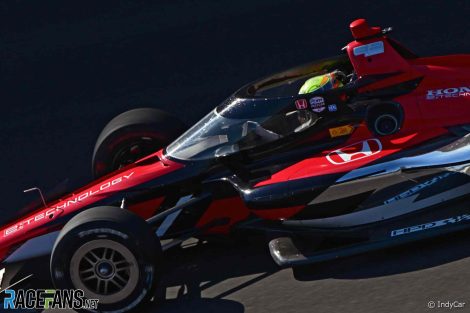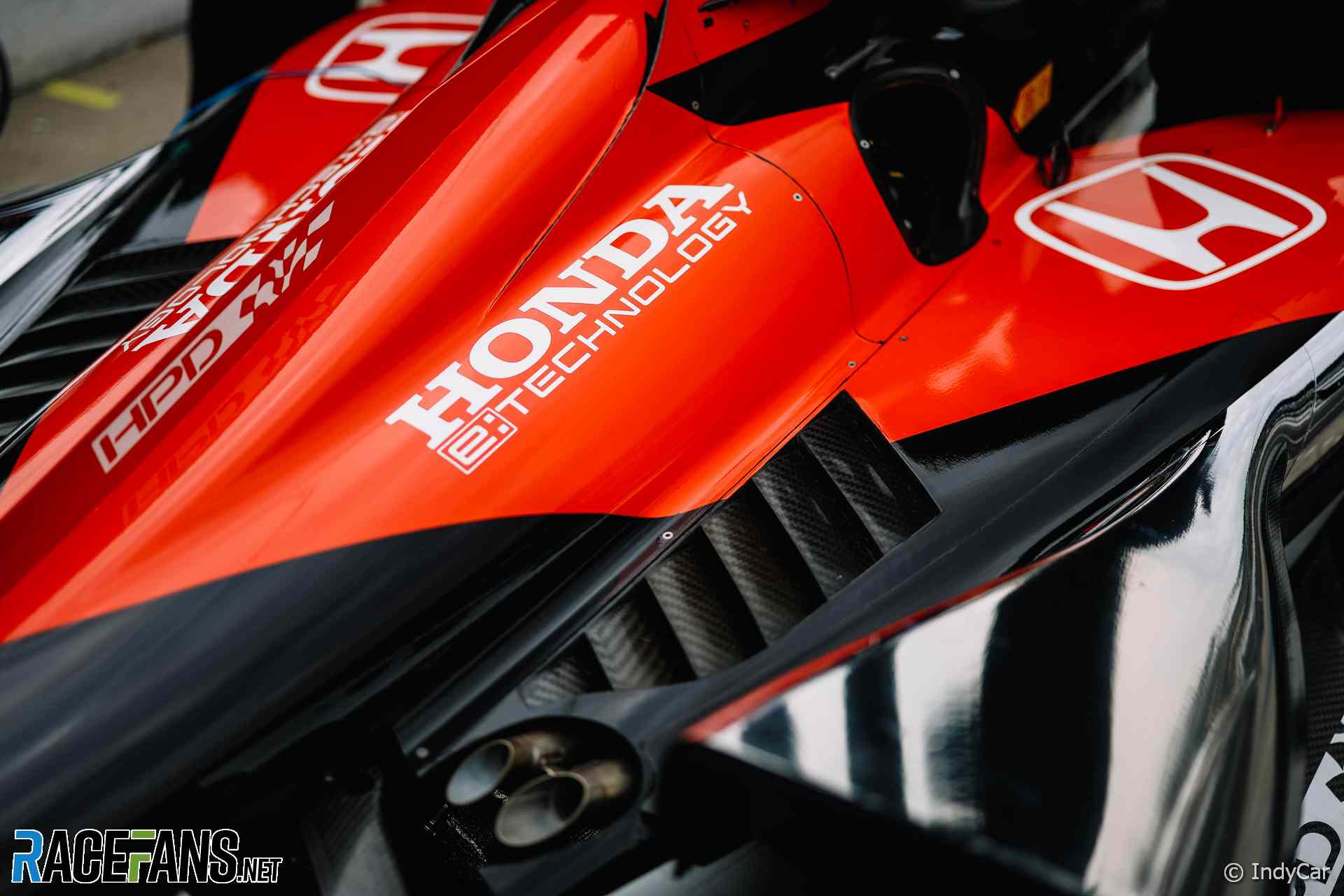IndyCar engine supplier Honda’s comments on the cost of participating in the series have drawn the attention of team owner Chip Ganassi.
The Japanese manufacturer recently said it has “great concerns” over the cost of remaining in IndyCar beyond when its current contract expires in 2026, particularly with the introduction of hybrid power next year.The manufacturer will power 13 full-time entries next year. In addition to Ganassi’s five-car team, Andretti, Meyer Shank and RLL will all use Honda engines
Ganassi said he’d “heard those same comments that we all read, and I really haven’t caught up with Honda lately, or haven’t caught up with them yet to discuss what exactly they mean and where they’re headed.”
“But I think it’s certainly got our attention and it’s something we have to keep a close eye on,” he added.
IndyCar announced last week that, after three months of teams testing hybrid units alongside their existing 2.2-litre turbocharged V6 engines, the new systems will not be introduced ready until after the Indianapolis 500.
Such a move would mean two sets of technical regulations being used within a single year. The series gave no further details given on how a mid-season switch will be made possible or exactly when it will take place.
Advert | Become a RaceFans supporter and
Ganassi, whose team has done extensive running during the test phase of IndyCar’s hybrid plans, called the decision “unfortunate” but said he supported it.

“It’s unfortunate, no question. But, it’s probably the right decision, knowing all I know. And from what I understand, it was probably the right decision to make. Sure, it’s not our first choice, I wouldn’t say it’s the optimum thing to do to delay, but it is the right thing to do with everything I know.”
He downplayed concerns over the complications of changing engine formulas halfway through IndyCar’s tightly-packed calendar of races.
“If they bring it in halfway through the season, I don’t think it’s as big a deal as people would think. In the testing that we’ve done with the hybrid, the teams are going to find it very easy to transmit over to that programme when the time comes. I don’t see that as a big thing.”
He is concerned the series’ switch to hybrid power does not negatively impact the quality of its races.
Advert | Become a RaceFans supporter and
“We want to make sure it’s right when it’s ready for primetime and then bring it along. But not too soon to discourage the type of great racing we have right now. I don’t think we want to do anything to impede that.
“Our on-track product is very, very good right now: More on-track passes than any open-wheel series in the world, I think, right now. So I think that speaks for itself in terms of IndyCar. We don’t want to mess that, or we don’t want to mess up the greatest spectacle in racing, which is the Indianapolis 500.
“So I think if the hybrid comes along some time after that, it’ll be fine, and it won’t be such a big challenge.”
IndyCar
- Ilott gets McLaren test call-up as team seeks substitute for Malukas
- Malukas expected to miss McLaren debut after surgery on wrist
- IndyCar moves final race from Nashville street track to oval
- Why IndyCar drivers fear new hybrids could prove a “season-killer” for them
- IndyCar needs F1-style push for “massive gains” in viewers – O’Ward





Mark (@blueruck)
13th December 2023, 12:53
Going out on a limb, I would bet hybrid doesn’t come to Indy car in 2024.
I would guess reliability is a problem. Announcing post Indy 500 means reliable is a problem over x miles and x is less than 500.
MichaelN
13th December 2023, 14:20
If Honda is giving these kinds of statements, one wonders who pushed for the hybrid PUs in the first place. It doesn’t do much for racing, one of the suppliers had cost concerns, and I imagine the chassis and safety guys aren’t too happy about it either.
anon
13th December 2023, 18:46
MichaelN, the parties that were pushing for the introduction of hybrid power units were Honda and Chevrolet.
It should also be noted that the above article doesn’t accurately reflect the actual concerns that Honda has about IndyCar’s engine programme and wrongly implies that the problem is with hybrid engines specifically.
On the contrary, ever since the DW12 was introduced back in 2012, they have had persistent financial problems with the cost of producing the current non-hybrid engines. From the very start, IndyCar has imposed leasing terms on the engine manufacturers that were intentionally set significantly below the cost of production, which means that the engine manufacturers have been operating at a heavy loss for more than a decade now.
According to an article produced by Marshall Pruett last year, the average cost for a team to lease engines from either Honda or Chevrolet is $1.3 million per annum for five engines. However, as a single engine actually costs around $2 million a year to operate, every single current engine lease contract results in a net loss to either Honda or Chevrolet of nearly $9 million a year.
When you look at what Honda actually said in their original statement, the complaint they raised is the same complaint that Honda and Chevrolet have been raising for the past decade – namely, they want IndyCar to find a third manufacturer to enter the series to take on some of the engine leases, therefore allowing Honda to shift some of the financial burden for subsidising the engines onto somebody else.
In fact, they don’t really mention hybrid engines that much, because most of their complaints actually related to the current engine lease system – which is largely independent of whether the engine is or isn’t a hybrid unit.
MichaelN
13th December 2023, 21:56
Thanks for that, the engines effectively being heavily subsidized by Honda and Chevrolet was something I’ve somehow managed to avoid hearing about for years! That does explain some of the posturing/statements; a move to hybrid PUs is a good chance to renegotiate some deals, and as you note, put some pressure on Indycar to find more suppliers.
Coventry Climax
13th December 2023, 17:11
Already commented on the first article about this.
Nothing new, really. Changing engine type midseason already struck me as odd, if not unlikely.
Will that new engine simply be a replacement for the old engine and ‘bolt onto’ the old chassis in exactly the same way as the old engine? That’s hard to believe, as that almost certainly disrupts the weight distribution of the cars.
The reason for postponement is not made clear, though I still stand by what I said then:
Whether it’s about overall weight, the weight distribution, dimensions, reliability or power output?
I also mentioned powers against hybrid in the first place could be at work. Honda threatening to withdraw certainly falls within that category. These hybrids are a joint venture between Honda and Chevrolet though, so maybe GM too is stepping on the brakes? So dependent on Honda they can’t do it on their own?
Anyway, this comment ends just like the previous one:
This is all giving me more questions than answers.
Mark
16th December 2023, 23:56
Sounds like a move to closer align to F1. It’s possibly the only way to get a shake up of the super license points to try and get some US kids on the F1 radar and make Indycar more appealing to ex F1 drivers. Just a thought on why the big push.
Asd
13th December 2023, 17:49
So…. nobody wants or needs those hybrids, nor will anyone benefit from them. But it costs a lot of money. Such a terrible move by IndyCar.
What I worry about now is how this will hurt IndyCar’s plans to finally introduce a new chassis. Teams will have less money for them, so not only it may delay the process, but also it will compromise what kind of chassis they will be able to choose for the series. They might even get stuck with Dallara DW-12 for another decade. Damn.
greasemonkey
14th December 2023, 14:57
Agreed. Pushing towards carbon neutral fuel is not simpler, tech&budget wise, for the cars themselves, but is also a more interesting counterpoint to hybrid/F1.
They are already on ethanol (although not neutral), and used to be methanol, so playing their cards on the fuel regime would fit IndyCar nicely.
greasemonkey
14th December 2023, 14:58
er “not only simpler”
Mark
16th December 2023, 23:58
Forget the battery power, go straight to Hydrogen.
Fer no.65 (@fer-no65)
13th December 2023, 18:26
I don’t understand why they’d announce a mid season engine swap knowing full well it’s impossible to do it. Guess they need the marketing of the “going green” stuff. But really, any other solution except delaying the introduction to 2025 is ridiculous.
wayne powers
14th December 2023, 14:32
I would like to see Indycar drop the hybrid and step into the future with a hydrogen ICE power unit. Where I live there are no tax breaks for hybrid cars, so the hybrid car has one foot in the grave. And turning Indycar to an EV battery series will kill it.
Coventry Climax
14th December 2023, 18:44
Given that Hybrid is just a bunch of stopgap bandaid gadgets to try and minimise the inherent losses of an IC, I agree on it being nice if they dropped hybrid. I’d like to see F1 do the same, for that matter.
A much more obvious choice would be to use a type of engine that does not have those losses in the first place, and that’s why you suggest hydrogen.
But I say: Indy is already running alcohol, all they have to do is assure they produce that sustainably, which, given how the quantities that motorsports uses compares to what america’s roadgoing vehicles would use, is peanuts.
Same in F1: They pat themselves on the chest for going to use sustainable fuels. Unfortunately though, it’s of the wrong type. In F1 too, alcohol would do just fine, sustainably wise.
And when the fuel is sustainable and -relatively- abundant, it doesn’t matter that much if you bring back the 3.5 ltr V8’s or any such, and consume a bit more. Now that would enhance the show again! And bring back the sports aspect of it all.
Where it went wrong, is when they decided F1 -as apparently has Indy- should be road relevant. That is about the biggest hoax imaginable actually, but it suits the commercial guys just fine suggesting that their road car is full of F1 technology, where in fact, none of them are. Commerce over sports, nothing else.
Mark
17th December 2023, 0:01
Well said, agree totally to both of you.